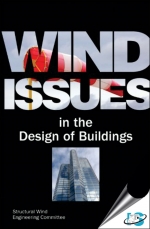Tab Article
Wind Issues in the Design of Buildings explains the ways that structural designers accommodate the impact of extreme wind events on the built environment. By studying the flow and pressure fields around buildings, architects and engineers can identify and select the best strategies for ensuring that a building will resist the loads due to high winds, maintaining pleasant conditions in outdoor spaces, assessing natural ventilation potential, and seeing that any exhaust fumes are dispersed adequately.
This volume identifies wind characteristics and describes the effects of winds generated by hurricanes, tornadoes, and thunderstorms. It explains the internal and external pressures on a building’s cladding (skin) and the effects of wind-borne debris. A building’s response to the structural loads caused by wind is outlined, along with techniques for resisting wind. A chapter is devoted to wind tunnels and physical modeling to predict structural loads, cladding response, pedestrian experience, topographic effects, and snow deposition. A section of frequently asked questions, a glossary, and recommended reading make this material in this volume accessible to students and nontechnical members of project teams.
Structural engineers and architects will find this book a useful aide in explaining wind-related issues to clients, builders, building officials, and owners. Students in structural and architectural engineering will welcome the clear, concise presentation of an important component of structural design.


